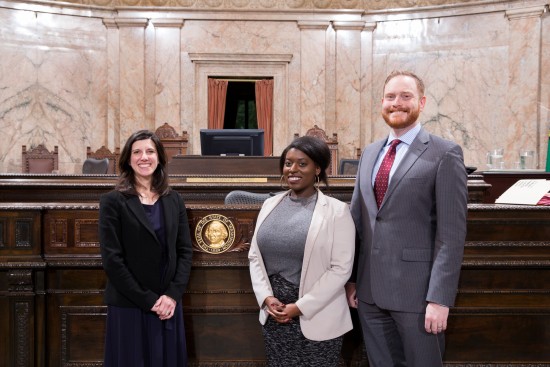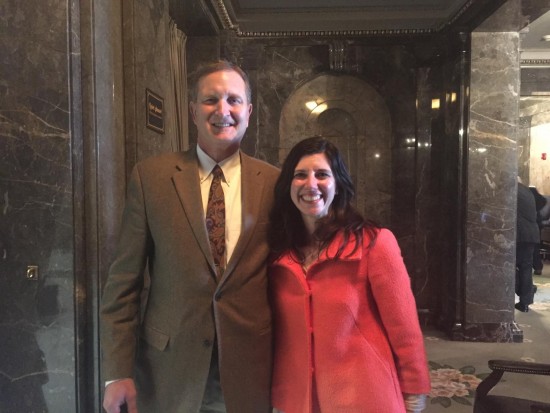Greetings from Seattle!
As you probably heard, the Legislature finally adjourned last Tuesday night after passing our supplemental budget. Although it took a couple of weeks of special session to reach an agreement and finish the legislative session, this budget moves us forward without compromising our values. Keep in mind this is a supplemental budget year, which means we make only minor adjustments to the 2015-2016 budget based on changes in population, revenue, and the use of state services. Read on to learn more about what we did in 2016, and what we face in 2017.

My long-time Legislative Assistant Nigel Herbig, and our 2016 Intern Jaleesa Smiley. I want to thank Jaleesa for her contributions to the office this year and wish her all the best in whatever comes next, and I want to thank Nigel for all of his help running the office and making session go so smoothly for me.
The Operating Budget
House Democrats had four major priorities in our original budget proposal and we made progress in each of these areas:
- Address the teacher shortage crisis. This budget will improve teacher recruitment and retention through investments in mentoring programs for new educators and increased training for paraeducators.
- Continue critical investments in state and community mental health services. People facing mental health crisis and their families are trying to navigate a broken system with inadequate resources. Patients and staff are unsafe in underfunded mental health facilities. We have increased investments in mental health services including additional state hospital staff, mobile crisis teams, and crisis triage beds.
- Help homeless families, kids, and veterans get into stable housing. Everyone should have a safe place to sleep at night, but all across the state the homelessness population is rising. It’s not just adults who are homeless, over 35,500 students in Washington are homeless. We address the growing homeless crisis in Washington state by investing in more emergency residential services and beds throughout the state; providing more resources to local governments to help more homeless people transition into permanent housing; and investing in programs that prevent youth homelessness.
- Improve the lives of foster kids. The foster care system is being squeezed on both sides – there are less foster families available, and, in part due to the heroin epidemic, there are more children in need of placement. We are improving the lives of foster kids through increased investments in child placement agencies, performance contracting, and caseload reduction.
School Funding/McCleary in the Budget
For those of you who care about education investments, while the legislature failed to make a meaningful payment towards our McCleary obligations, my colleagues and I were successful in advocating for keeping homeless students near their schools, easing the teacher shortage, improving the opportunity gap, and reducing overcrowded classrooms. It’s not everything I wanted, of course. That’s the reality of a divided government – the only path forward is through compromise, but it is a path forward and sets the stage for the challenges ahead in 2017 when the Legislature must adopt a solution to end the state’s reliance on local levies and fully fund basic education. I am committed to rebuilding the middle class and we know that a great education provides a pathway to future success.
The Capital Budget
Before we gaveled out of session, we also passed our supplemental Capital budget. The Capital budget helps fund important projects throughout our community, and it continues to do so this year, including a new pilot program to build modular classrooms at West Woodland Elementary School out of a new material called cross-laminated timber. The Capital budget also funds the feasibility study called for in my bill to save the Saint Edward seminary in Kenmore (see below for more details about this bill).
Some other very important programs, like the Model Toxics Control Act (which funds clean-up of toxic sites) and the Public Works Trust Fund (which lends funds to cities, water and sewer districts, etc, to fix and improve their aging infrastructure), were cut in this year’s Capital Budget. The Legislature made some detrimental changes to the Model Toxics Control Act by skipping over worthy projects that have been in the works for years and giving state dollars for clean-ups when there is a private entity which is liable and should be cleaning up its own mess. As the Legislature has done before, funds were removed from the Public Works Trust Fund to fund our operating budget. All across Washington, cities, counties, and other municipal corporations, will have less access to funds to fix their broken infrastructure.
After much thought I had to vote against the Capital budget as the bad from the damage to the Model Toxics Control Act and the Public Works Trust Fund outweighed the good. I will be working in future sessions to rebuild both programs in future budgets.
Charter Schools
One of the most contentious topics this session was charter schools. As you know, last year the State Supreme Court ruled the charter school initiative unconstitutional, and some Members immediately started working on a legislative fix (Senate Bill 6194) to keep the charters open. I voted no on the charter bill because at a time when we are being held in contempt of court by the Supreme Court for not properly funding our public schools, when 35,000 homeless students aren’t receiving the support they need to succeed, where kindergarten classes of 30+ are the norm and there is no solid plan in place to pay for the classrooms necessary to meet our class size reduction mandate, and where our teachers continue to be underpaid, I could not justify prioritizing a fix to a small part of our education system. Furthermore, I believe the bill the legislature passed did not address the constitutional concerns laid out by the court, such as putting charter schools under local control.
Saint Edward State Park Seminary
As I mentioned above, my bill (House Bill 2667) to help save the Saint Edward Seminary in Kenmore passed, and was signed by the Governor. As many of you know, the seminary building in St. Edward State Park has been being neglected for decades, and is slowly rotting away from the inside. Public access to the building is limited, but to many it is an incredibly important element of the park. Estimates to restore the building range up to $50 million, and unfortunately the Legislature has directed State Parks to operate with next to no support from the General Fund. Parks has had to adopt an entrepreneurial mindset – selling Discover Passes, and working with a Public Development Authority to keep Fort Warden in Port Townsend open and operating. It is extremely unlikely that State Parks will have the $50 million to keep the seminary building standing, and is currently struggling to fund the $100,000/year they spend just to keep the building heated (which helps slow the deterioration).
My bill directs the Department of Commerce to conduct a study on the economic feasibility of potential public or nonprofit uses of the seminary building. Hopefully the study identifies some public or nonprofit uses that are viable, but if it fails to identify an economically viable public or nonprofit use of the seminary it then allows the Parks Commission to enter into a lease of up to 62 years for the seminary, gym, and pool, with a supermajority vote.
People love their parks, and many people care very deeply about Saint Edward. It is an precious asset to Kenmore and the surrounding region. I have heard from folks both in favor of saving the seminary, and those against proposals to save the building. I view the building as a valuable part of the park, and am hopeful that the increased public participation through the Department of Commerce study will result in viable public or nonprofit alternatives. If it does not, the bill gives the Commission the flexibility they need to enter into an lease with a developer who will save the historic building.
This was also a great example of working across the aisle – I had the distinct pleasure of working closely with Rep. Jeff Holy (R-Cheney) who attended the seminary, and helped me work with his colleagues to craft a bill that could help save the building, and pass the legislature.

Addressing Carbon Pollution
Unfortunately I-732, which would have instituted a carbon tax, was not brought up for a vote.
What’s Next?
While I am happy to now be back in Seattle with my family, I am already working on bills for next session. I plan to reintroduce a distracted driving bill, and a new version of the Pregnant Worker’s Fairness Act, as well as to fully fund our public schools and improve education opportunities for all students in Washington.
